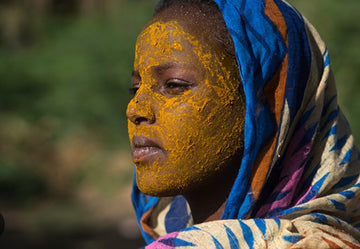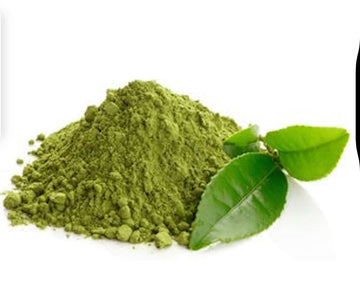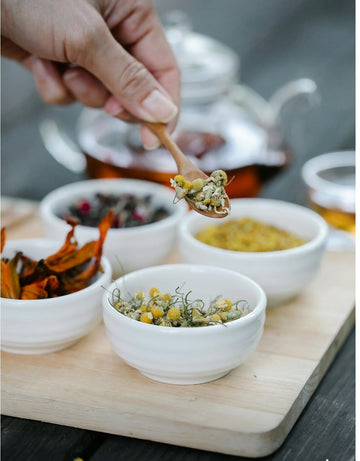The wellness and health generation—millennials, Gen Z, sensitive skin sufferers, eco-conscious consumers, and wellness enthusiasts—has sparked a revolution in the beauty industry, prioritizing natural skincare solutions that align with their values of holistic health, sustainability, and ethical practices. Tea-based skincare has emerged as a powerful trend, with guava, baobab, and hibiscus teas standing out for their scientifically backed benefits. Tea-Licious Skincare, a brand rooted in nature and mindfulness, harnesses these teas to create handcrafted, eco-friendly products that nurture both skin and soul. This blog delves into the research behind guava, baobab, and hibiscus teas in skincare, exploring their impact on physical health, mental wellness, and radiant skin, while highlighting Tea-Licious Skincare’s role in sustainable beauty.
The Rise of Tea-Based Skincare: A Natural Revolution
Tea has been celebrated for centuries for its health benefits, but its role in skincare is gaining renewed attention due to its rich composition of antioxidants, vitamins, and healing compounds. Research highlights that teas like guava, baobab, and hibiscus offer unique properties that address a range of skin concerns, from acne and aging to dryness and inflammation. Tea-Licious Skincare, founded by Lorraine Cook, leverages these benefits in their small-batch, chemical-free beauty products, aligning with the wellness and health generation’s demand for natural skincare advocacy.
The global tea-based skincare market is projected to reach USD 1,300 million by 2033, growing at a CAGR of 8.3% from 2023 to 2033, driven by increasing awareness of the risks associated with synthetic cosmetics. This trend resonates with eco-conscious consumers who prioritize environment-friendly beauty and ethical skincare practices. Tea-Licious Skincare’s commitment to plastic-free packaging and cruelty-free production makes it a top choice for those seeking beauty without compromise.
Guava Tea: A Powerhouse for Acne and Anti-Aging
Guava tea, derived from the leaves of the guava tree (Psidium guajava), is a lesser-known gem in skincare, but research underscores its potential to transform skin health. Guava leaves are rich in antioxidants, including vitamin C, flavonoids, and tannins, which offer antibacterial, anti-inflammatory, and anti-aging benefits.
Research on Guava Tea in Skincare
Studies show that guava leaf extract has significant antimicrobial properties, making it effective against acne-causing bacteria like Staphylococcus aureus. A 2019 study published in the Journal of Cosmetic Dermatology demonstrated that guava toner reduced sebum production in a split-face, randomized, single-blind placebo-controlled study, highlighting its efficacy for oily and acne-prone skin. This aligns with Tea-Licious Skincare’s focus on sensitive skin, as their guava tea-infused products can help manage breakouts without irritation.
Guava tea also combats signs of aging. Its high vitamin C content—up to four times that of an orange—acts as a potent antioxidant, neutralizing free radicals that cause premature aging. A 2004 study in the Journal of Zhejiang University Science found that guava leaf phytochemicals, such as carotenoids and polyphenols, exhibit strong antioxidant activity, protecting skin cells from oxidative stress. This makes guava tea a natural choice for those seeking smooth skin and a youthful glow, a benefit Tea-Licious Skincare incorporates into their handcrafted soaps and serums.
Baobab Tea: Nourishing Dryness and Strengthening the Skin Barrier
Baobab tea, derived from the fruit of the baobab tree (Adansonia digitata), native to Africa and Madagascar, is a rising star in skincare due to its nourishing and protective properties. Baobab is often called the “Tree of Life” for its ability to thrive in arid environments, and its tea and oil are packed with vitamins and omega fatty acids that benefit the skin.
Yes, tribal African women, particularly in regions where the baobab tree (Adansonia) is native, have traditionally used parts of the baobab in various ways, including for skin care. The baobab tree, often called the "Tree of Life," is a vital resource in many African cultures due to its versatility.
The fruit pulp, seeds, and oil extracted from the baobab seeds are commonly used. Baobab seed oil, in particular, is rich in vitamins (like Vitamin C and E), antioxidants, and essential fatty acids, making it an excellent natural moisturizer. Women in tribes such as those in Senegal, Mali, or Madagascar—where baobab trees are abundant—have historically applied baobab oil to their skin to hydrate, protect against harsh environmental conditions (like sun and wind), and promote healing of minor cuts or dryness. The oil is lightweight, non-greasy, and easily absorbed, which suits the needs of people in hot, arid climates.
Additionally, the fruit pulp—high in Vitamin C—may be mashed and used in mixtures for skin brightening or to soothe irritation. While specific practices vary across tribes and regions, these uses align with traditional knowledge passed down through generations. Today, baobab oil has also gained popularity in global skincare markets, but its roots are deeply tied to indigenous African practices.
Research on Baobab Tea in Skincare
Baobab is rich in vitamins A, D, E, and F, as well as omega-3, omega-6, and omega-9 fatty acids, which deeply moisturize and strengthen the skin barrier. A 2018 study in Molecules highlighted baobab’s antioxidant and anti-inflammatory properties, noting its ability to nourish dry, sensitive, or mature skin. The study found that baobab oil’s omega fatty acids help lock in moisture, making it ideal for combating dryness—a common concern for sensitive skin sufferers.
Baobab also promotes a healthy skin barrier, crucial for protecting against environmental stressors. Cosmetic chemist Rachel Ho, as cited in a 2022 Byrdie article, notes that baobab’s omega content makes it a great ingredient for maintaining skin barrier health, reducing transepidermal water loss, and improving skin resilience. Tea-Licious Skincare incorporates baobab tea extracts into their moisturizers to provide intense moisture retention and a protective shield for the skin.
Baobab Tea for Wellness
Baobab tea supports overall health with its high vitamin C content, which boosts collagen production—a key factor in skin elasticity. The same Molecules study found that baobab’s vitamin C levels surpass those of most fruits, aiding in collagen synthesis and wound healing. This internal benefit enhances baobab’s external effects, aligning with the wellness and health generation’s holistic approach to beauty. Tea-Licious Skincare’s use of baobab tea in their products offers a dual benefit: nourishing the skin while supporting overall well-being.
Hibiscus Tea: The Anti-Aging and Hydrating Hero
Hibiscus tea, made from the calyces of Hibiscus sabdariffa, is often dubbed the “Botox herb” for its anti-aging properties. Its vibrant red hue belies a wealth of skincare benefits, backed by research that highlights its ability to rejuvenate, hydrate, and protect the skin.
Research on Hibiscus Tea in Skincare
Hibiscus is rich in antioxidants called anthocyanins, which combat free radicals that cause premature aging. A 2022 study in PMC found that hibiscus acid, a key compound in hibiscus, reduces oxidative stress in skin fibroblasts by lowering extracellular ATP secretion and maintaining a high reduced/oxidized glutathione (GSH/GSSG) ratio. This protective mechanism helps prevent wrinkles and fine lines, making hibiscus a powerful anti-aging ingredient.
Hibiscus also contains alpha-hydroxy acids (AHAs) like citric and malic acid, which gently exfoliate the skin. A 2020 MindBodyGreen article notes that these AHAs slough away dead skin cells, encouraging cell renewal and reducing hyperpigmentation for a more even complexion. This makes hibiscus ideal for exfoliation lovers seeking a radiant glow. Tea-Licious Skincare’s hibiscus lotion bar leverages these properties, providing gentle exfoliation and hydration in one product.
Research also supports hibiscus’s role in wound healing and hydration. A 2015 study cited in StyleCraze found that hibiscus extract improved wound contraction and closure in rat studies, outperforming a popular topical ointment. Additionally, hibiscus’s mucilage content—a sticky, viscous fluid—acts as a natural moisturizer, as noted in a 2019 Vogue India article. This hydrating property is perfect for maintaining skin moisture in spring, a season Tea-Licious Skincare focuses on with their hydrating mist.
Tea-Licious Skincare: A Perfect Fit for the Wellness and Health Generation
Tea-Licious Skincare’s use of guava, baobab, and hibiscus teas aligns perfectly with the wellness and health generation’s values. Millennials and Gen Z, who prioritize mindfulness and self-care, appreciate the brand’s focus on rituals that support mental wellness, such as pairing their tea-infused cleanser with deep breathing exercises. Sensitive skin sufferers benefit from the gentle, non-toxic properties of these teas, which soothe irritation without causing flare-ups. Eco-conscious consumers are drawn to Tea-Licious’s plastic-free packaging and small-batch production, ensuring their skincare choices support a healthier planet.
Wellness enthusiasts value the holistic benefits of Tea-Licious’s products, which combine external skincare with internal health support. For example, sipping guava leaf tea can lower blood sugar levels, as noted in a 2019 Medical News Today article, while applying a guava tea-infused product reduces acne. This internal-external approach resonates with the generation’s preference for comprehensive wellness solutions.
Spring Skincare Ritual with Tea-Licious: Guava, Baobab, and Hibiscus
Spring is a season of renewal, but it also brings challenges like pollen-induced irritation. Tea-Licious Skincare offers a spring ritual using guava, baobab, and hibiscus teas to soothe skin and nurture health. Start with their tea-infused cleanser, which combines chamomile and guava tea to calm redness and inflammation.
Follow with a hydrating mist infused with hibiscus tea, which provides a burst of moisture and gentle exfoliation, thanks to its AHAs. The mist’s refreshing scent uplifts the senses, promoting mental clarity—a key aspect of wellness for millennials and Gen Z. Finish with a baobab tea-infused lotion bar, such as the Green Tea and Hemp Lotion Bar, to lock in moisture and strengthen the skin barrier, as supported by the Molecules study on baobab’s omega fatty acids.
This ritual not only addresses springtime skin concerns but also supports overall well-being, aligning with the wellness and health generation’s holistic approach to beauty. The act of cleansing, misting, and moisturizing can be paired with deep breathing exercises outdoors, enhancing mental wellness while nurturing the skin.
Sustainability and Ethical Practices: Tea-Licious’s Core Values
Tea-Licious Skincare’s commitment to sustainable beauty and ethical skincare practices further enhances its appeal. Their plastic-free packaging addresses the beauty industry’s waste problem, resonating with eco-conscious consumers. The brand’s small-batch production ensures freshness and quality while minimizing waste, as highlighted in their mission to support environment-friendly beauty. Their cruelty-free practices align with the generation’s ethical standards, ensuring no animals are harmed in the production process.
Conclusion: Embrace Tea-Based Skincare with Tea-Licious
The research on guava, baobab, and hibiscus teas underscores their transformative benefits in skincare, from combating acne and aging to hydrating and protecting the skin. Tea-Licious Skincare harnesses these teas in their handcrafted products, offering a natural, eco-friendly solution for the wellness and health generation. Whether you’re seeking to soothe springtime irritation, hydrate in summer, or support overall well-being, Tea-Licious delivers beauty without compromise. Explore their collection at tea-liciousskincare.com and join the tea-based skincare revolution for a healthier, more radiant glow.
References:
- Tea-Licious Skincare Official Website: tea-liciouskincare.com
- Explore Tea-Licious Products: tea-liciouskincare.com/collections
- Molecules (2018) on Baobab Benefits: mdpi.com/1420-3049/23/12/3104
#NaturalSkincare #EcoFriendlySkincare #EthicalSkincare #HandcraftedSkincare #ChemicalFreeBeauty #SmallBatchSkincare #ExfoliationLovers #TeaSkincare #TeaLiciousSkincare #SmoothSkin #TeaBasedSkincare #GreenTeaSkincare #EnvironmentFriendlyBeauty #BeautyWithoutCompromise #NaturalSkincareAdvocate #SustainableBeauty #CrueltyFreeSkincare #Wellness





